Six Great Heroes of Epic Fantasy, Part 2
On Friday 8 I posted the first instalment of my line up for Six Great Heroes of Epic Fantasy: Astrin Ymris (Patricia McKillip's The Riddlemaster of Hed trilogy), Coltaine (Steven Erikson's Deadhouse Gates), and Druss the Legend (David Gemmell's Legend.)
I also suggested that there might be a seventh or bonus hero and so it has proven to be because, to continue in alphabetical order, I just could not leave out—
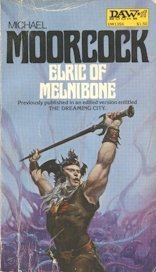 E which is for Elric of Melnibone, renegade emperor, outcast, warrior-sorcerer, god-slayer and defender of free will, from Michael Moorcock's Elric series, which starts with Elric of Melnibone.
E which is for Elric of Melnibone, renegade emperor, outcast, warrior-sorcerer, god-slayer and defender of free will, from Michael Moorcock's Elric series, which starts with Elric of Melnibone.
Now I know that some of you may argue that Elric isn't even a hero—he is in fact the quintessential antihero. And I could just say that I don't care and am including him anyway, simply because Elric seized my imagination so powerfully as a very young SFF reader. I will, however, make my case for Elric being a hero—besides simply being the possessor of a deadly, soul-sucking sword called Stormbringer (if you love "elves" with soulsucking swords—forget Cherryh's Morgaine or Erikson's Anamander Rake: think, Elric.)
Elric is certainly a chaotic force and possesses a certain moral ambiguity, or perhaps it would be more correct to say that he is a practitioner of realpolitik, but he is also a champion of free will, particularly against the gods of chaos that are seeking to take over the human realm. So certainly, in the sense of "hero-protagonist" Elric is one of the outstanding heroes of epic fantasy and I believe has to be on my list.
In terms of what makes him most interesting … I think for me it is his championing of free will, when fate, portent, and doom are such strong threads in much fantasy (deriving I believe, from its roots in mythology and folklore.) Elric definitely challenges and overturns that model.
—
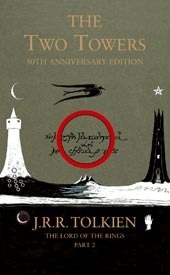 F is for Faramir, second son of the Steward of Gondor and head of the rangers of Ithilien in JRR Tolkien's The Lord of the Rings.
F is for Faramir, second son of the Steward of Gondor and head of the rangers of Ithilien in JRR Tolkien's The Lord of the Rings.
Those of you who have only seen the film version of The Lord of the Rings may well cry: "but surely you should choose Aragorn or Legolas, or even (Sean Bean as) Boromir, not Faramir." I think those who have read the novel, however, will be less surprised by my choice.
Faramir first appears in The Two Towers, as captain of Gondor's rangers in Ithilien, a territory on the border of Mordor. From the first time I read it, I felt that he was one of the strongest and most real characters in the book—something that really didn't come across in the films and was one of my most keenly felt disappointments in relation to the big screen treatment of the story.
The Faramir of the book is much more human and less 'high and remote' than Aragorn, but like both Aragorn and Galadriel, he also refuses the temptation of the one ring of Sauron—something his older brother, Boromir, was unable to do. So Faramir shows himself to have both insight—he is smart enough to know that taking the ring will ultimately do him and Gondor no good—as well as the strength of will and moral integrity necessary to refuse the ring.
I also like Faramir because although he is, of necessity, a soldier in the cause of Gondor, he values the benefits of peace and civilization, such as learning and healing, above the arts of war. He also holds to his duty despite the mistrust of his father (the films got that right), but not stupidly, ie not the forlorn, suicidal charge to certain death of the films, but rather in holding together a fighting retreat from Osgiliath 'against the odds.'
In the book, Faramir is a quiet character, but a very strong one, not because of his deeds of arms but because of his moral character. And because he is a more everyday character than the more remote figure of Aragorn, he is also a character that we can relate to.
—
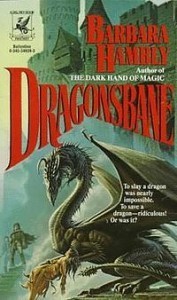 J is for John Aversin, knight, amateur scholar, and relucant dragonslayer in Barbara Hambly's Dragonsbane.
J is for John Aversin, knight, amateur scholar, and relucant dragonslayer in Barbara Hambly's Dragonsbane.
I mentioned both Astrin Ymris and Faramir as soldiers out of necessity rather than inclination, but I think John Aversin in Dragonsbane is probably the epic hero where "sense of duty" is most powerfully drawn. John is the only knight in a remote region that has been abandoned by the larger kingdom that once ruled it (think territories such as Britain following the withdrawal of the Roman Empire, although the world is more medieval/early renaissance) to general lawlessness, incursions by raiders and, in one notable case, a dragon. John doesn't fight the dragon because he wants to (he definitely doesn't), or for glory, but because as the only knight, he feels he has to: it is preying on both the people of the region and the animals they depend on for survival and there is no one else to do the job. He doesn't kill the dragon nobly either, by charging to meet it with a sword, but by catching it asleep, shooting it with poisoned harpoons, and chopping off its wings first with an axe. John Aversin lives in a brutal world and survival is a brutal business.
Here's the thing though, he is not a brute. John at face value is a fairly everyday sort of guy, who like Astrin and Faramir does his fighting out of necessity, not pleasure, and is far more interested in amateur science than fighting dragons (which has a bad habit of getting you messily killed.) One of the things I really like about John Aversin as a character is that he has an inquiring mind. Another is that he is perceptive about people and has compassion for the situation of those less fortunate than himself, but not in a "preachy" way: he just gets in there and does what needs to be done. (He's not necessarily a man of few words though; when he's talking about one of his pet theories he is enthusiastically loquacious.)
So when John is asked to fight another dragon (the real story, by the way; the rest is backstory, not spoilers), this time for the current king of the realm that has abandoned the north, he agrees very reluctantly—in exchange for the promise that the kingdom will again return its armies and its protection to the north. So John Aversin also has that truly heroic quality of being willing to put himself at risk for the greater good. No question, he belongs on this list.
—
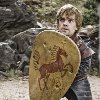
Peter Dinklage as Tyrion Lannister in the HBO series, "A Games of Thrones"
T is for Tyrion Lannister, dwarf, all round smart guy, and leader of men in George RR Martin's A Song of Ice and Fire series, beginning with A Game of Thrones.
Several people noted that I didn't include any of George RR Martin's heroines amongst my Six Great Heroines of SFF, although several of them were on the longlist, which concluded my post here. There were definitely several contenders for the "Six Great Heroes" list, however, not least Ned Stark and Jon Snow. But actually, Tyrion Lannister was a fairly easy choice.
No question, Tyrion has a pretty rough row to hoe in the world of Westeros. It isn't easy being a dwarf in a world where knightly prowess is the "coinage that counts." He is also despised and disregarded by his father, the powerful Tywin Lannister. Yet from the beginning, I found Tyrion one of the most intriguing characters in the series. First off, he is smart and able; he is also astute, which is not quite the same thing as being clever, ie he has perception and insight into peoples natures and motivations.
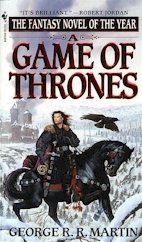 Tyrion is personally brave as well, something that is usually overlooked by those around him because of his stature, and leads a successful military defence of the capital city in the second-in-series, A Clash of Kings. And although as capable of savagery as any character in Martin's brutal world of Westeros, Tyrion is less inclined to it than most and is, I would say, more naturally disposed to kindness and generosity than the majority of the other characters.
Tyrion is personally brave as well, something that is usually overlooked by those around him because of his stature, and leads a successful military defence of the capital city in the second-in-series, A Clash of Kings. And although as capable of savagery as any character in Martin's brutal world of Westeros, Tyrion is less inclined to it than most and is, I would say, more naturally disposed to kindness and generosity than the majority of the other characters.
When I reflect on the A Song of Ice and Fire series Tyrion Lannister is always one of the standout characters and given the stature of the series to date, that has to make him one of the great heroes of epic fantasy.
—
So there it is, not six but seven great heroes of epic fantasy! I think this post is already long enough so I won't add a longlist of "could-also-easily-have-been-on-the-list" characters, as I did with the heroines. But you could help with that—we've already had Lord Mhoram from the first Thomas Covenant series put forward on Friday. What names would you add to the list?



